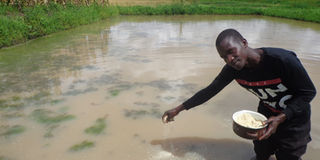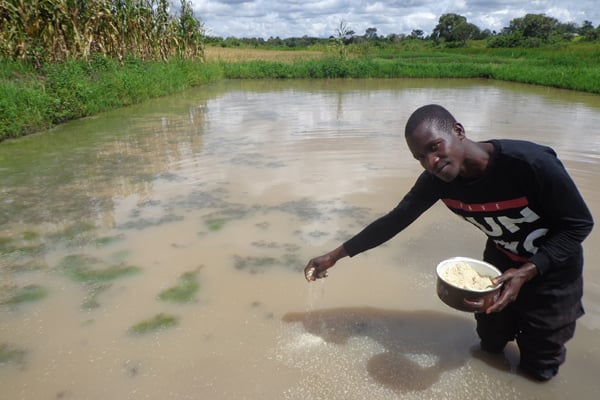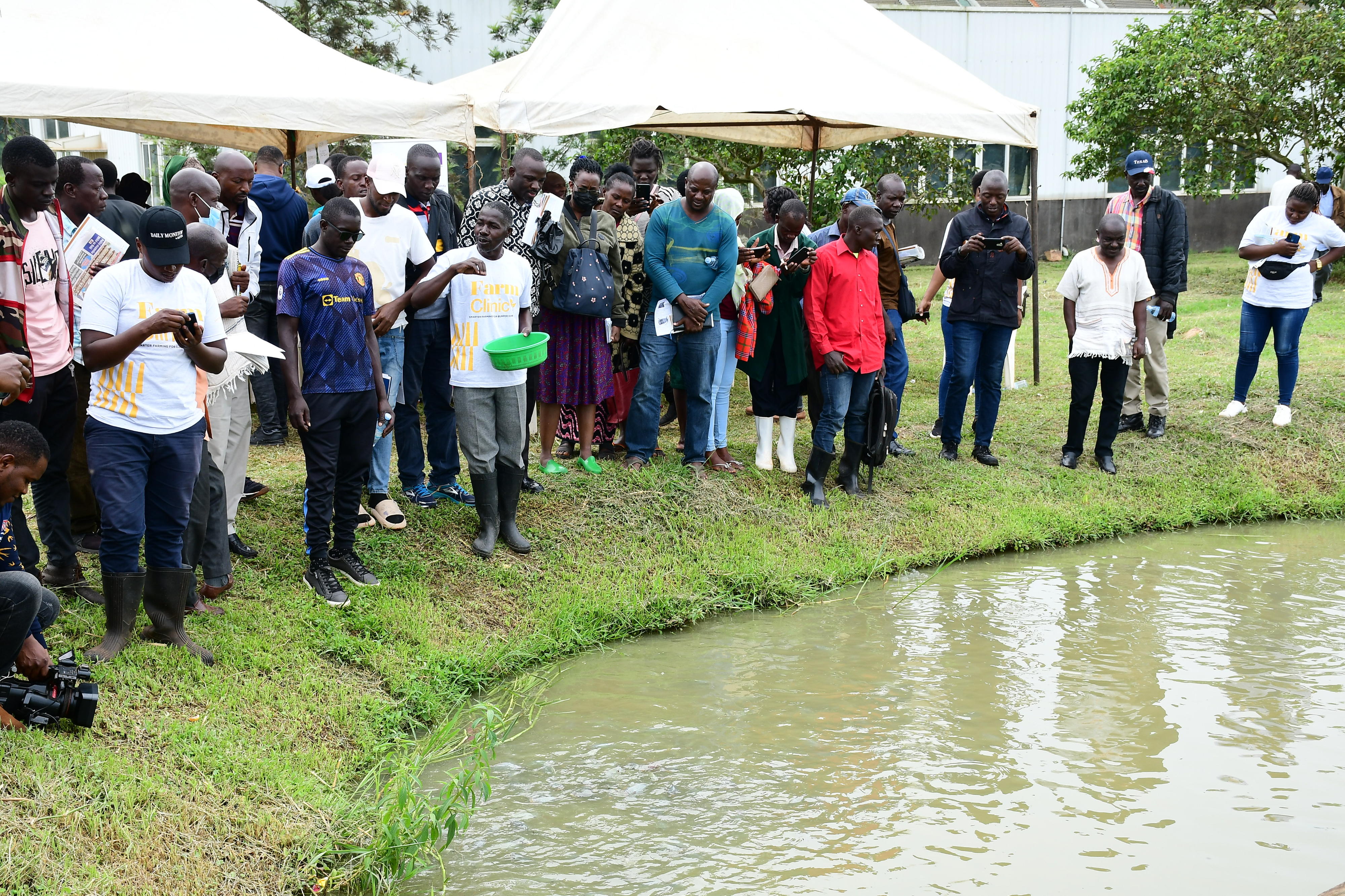De Heus launches dedicated aquafeed plant

Boniface Oyet feeding his fish in one of his ponds in Lira District. He sees aquaculture as a way to ensure Uganda’s food security. Photo/Charity Akullo.
What you need to know:
- Farmers in Uganda are cautiously optimistic that the establishment of the dedicated fish feed plant by De Heus will lead to a significant reduction in feed prices.
De Heus, a leading animal nutrition company, has launched the opening of a dedicated fish feed plant in Njeru, Buikwe District, Uganda.
The state-of-the-art factory, operated under the name Koudijs, is set to produce 50,000 metric tonnes of fish feed annually, with operations expected to commence in the second half of the following year.
The plant has been strategically designed to meet the needs of farmers and integrators by delivering high-quality products. In addition, De Heus has prioritised environmentally friendly production processes, employing automation and advanced technology to prevent emissions to land, water, and air.
Confident
Bon Tjeenk Willink, General Manager for De Heus Uganda, expressed confidence in the company’s ability to leverage the plant’s offerings to strengthen their position in the thriving East African market.
“I have great confidence that through the delivery of products from this premix factory, in combination with the elaborate knowledge and services offered by our specialists, we will take the next step together to further build on the potential of the sizeable East African market,” Bon Tjeenk Willink said during the ground breaking ceremony which was also attended by Dr Karin Boven, the ambassador of the Kingdom of the Netherlands.
Traditionally, Uganda has relied on imported fish feed from countries such as the Netherlands, Brazil, Egypt, Zambia, Mauritius, and Israel.
However, the importation process has presented challenges, often taking up to four months.
The increasing number of fish farmers, particularly in cage fish farms, has generated a surge in demand for fish feed within the country.
De Heus’ investment in the fish feed plant marks the first major international endeavor of its kind in Uganda.
The company has been collaborating with Koudijs since 1998, establishing a strong presence in the region.
Powering progress
With fish being a vital source of nutrition in Uganda and a key contributor to food security, the demand for farmed fish has risen due to stagnation or decline in wild catch coupled with rapid population growth.
Uganda’s abundant water resources, including large lakes and favourable water temperatures, present significant potential for aquaculture.
The launch of the dedicated fish feed plant is expected to have a positive impact on aquaculture not only in Uganda but also in surrounding countries.
The industry has demonstrated promising growth in recent years but requires access to affordable and reliable quality feeds to further develop.
Robert Osinde, the chairperson of the Uganda Commercial Fish Farmers Association (UCFFA), highlights the lack of locally produced fish feed as a major hindrance to the industry’s expansion.
Post-Covid challenges
The Covid-19 pandemic has dealt a significant blow to fish farmers in Uganda, as they grapple with exorbitant flight costs that have surged since the outbreak.
Prior to the pandemic, shipping a container weighing 26.5 tonnes from Uganda to Mombasa cost farmers around $3,300. However, the price has skyrocketed to a staggering $9,000 in the wake of COVID-19.
This increase has had a profound impact on the farmers, with each container now costing approximately $12,000, posing a severe challenge to their operations and profitability.
Farmers in Uganda are cautiously optimistic that the establishment of the dedicated fish feed plant by De Heus will lead to a significant reduction in feed prices.
Currently, feed costs account for more than 60 percent of the overall expenses incurred in fish production, placing a substantial financial burden on farmers.
The average price for a tonne of feed stands at approximately $1,050, reflecting a steep increase from around $750 within a span of just two years.
De Heus aims to address this challenge by establishing a local factory that will offer a shorter and more flexible supply chain.
By producing fish feed locally, De Heus plans to improve the business prospects for fish farmers and enhance employment opportunities in the sector.
The company intends to source raw materials such as maize, cassava, soy, and others locally whenever possible. This approach will not only reduce dependence on costly imports.
Expertise
De Heus brings a wealth of global experience and expertise to Uganda’s aquaculture industry.
The company’s commitment to expanding its footprint in Africa is demonstrated by its investments in various countries, including South Africa, Egypt, Ethiopia, Ghana, and Ivory Coast.Founded in 1911 and now operated by the fourth generation of the family, De Heus animal nutrition has grown rapidly, specialising in Dutch agricultural innovation.




